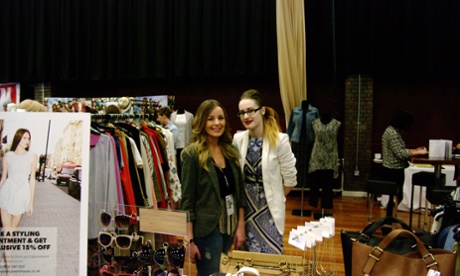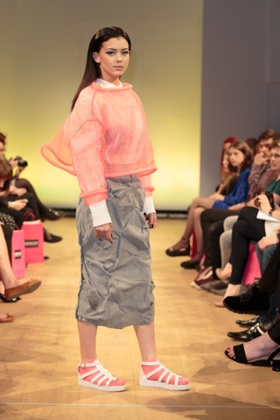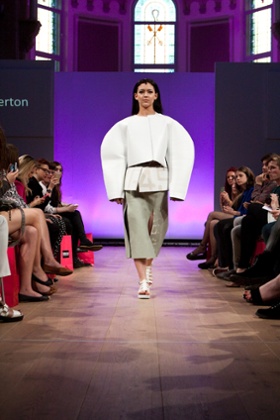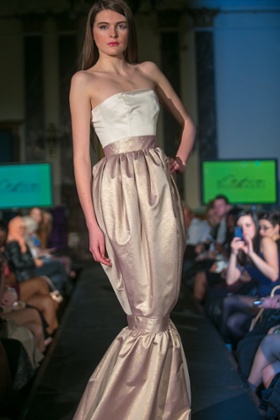UK cities take on London in the fashion stakes
June 7, 2014 by admin
Filed under Lingerie Events
A team of volunteers, mainly women in their early 20s, hover around the models helping to tie shoelaces, zip up boots and fasten dresses. Strewn hairpins lay on the floor as models queue to have their hair blow-dried at the double, while others jump in and out of outfits like bunny rabbits. Finally the event coordinator dons a headset, shouts for the models to line up, and the show begins.
Inside the city’s iconic banqueting and conference hall, spectators have squeezed into their seats to watch the catwalk display. But this is not London, Paris or Milan – rather, it is Newcastle Fashion Week, which over nine days in May set out to “cement its reputation as the fashion capital of the north”.
Fed up with London Fashion Week (LFW) getting all the attention, Newcastle, Manchester, Birmingham, Bath, Norwich and
Durham have in recent years all launched fashion weeks to help boost their local
economy and support the local design talent. With the announcement last September at the opening of LFW that the direct value of the fashion industry to the UK economy is £26bn, it makes sense that these alternative fashion weeks in the UK are hoping to get their share of the recognition.

“As great and as
impressive as London Fashion Week is, it’s only for London,” said Jonathan Sassen, director of Manchester Fashion Week. “From our point
of view, I’m trying to raise awareness of Manchester designers.” Sassen helps local
designers by offering top catwalk spaces to local independent stores, while
offering the graduate days for free to local rising design talent. What’s more, with Manchester under his belt, Sassen plans to launch Glasgow fashion week next year.
London might
have Central Saint Martins, the famed fashion school with graduates that are a
who’s-who of LFW, but in recent years it has started to face
stiff competition from fashion courses around the country. Nabil el-Nayal, a recent graduate of Manchester Metropolitan University’s school of art has garnered
column inches in Vogue and his designs have been stocked in Harrods. He is just one example of
why MMU is recognised
as one of the top five universities to produce young fashion designers in the UK. In Scotland, Edinburgh College of Art, whose alumni include
Holly Fulton, is another institution making
waves. And while el-Nayal and Fulton are now mainly based in London, the new regional fashion weeks are hoping to court local talent rather than lose it to the capital.

“Our aim is to
showcase the breadth of the industry in Newcastle and the north-east –
pulling it together in a week-long event that turns the spotlight on Newcastle,
the industry, encourages public participation, recognition and appreciation of
all that is happening in the city and drives footfall and sales for
participating business,” said Sara Ragan of Newcastle Fashion Week (NFW).
The event saw major fashion brands such as HM and Dorothy Perkins collections on the catwalk, combined with graduate designers including Dayne
Henderson, a graduate who has designed costumes for Lady Gaga. The event’s guest host, fashion designer Julien MacDonald, presented the opening catwalk
show. MacDonald praised the design talent coming through in the north-east, adding: “Newcastle
is an emerging city and events like Newcastle Fashion Week really put it on the
map.”
For north-east designer Michelle Taylor and her lingerie brand Tallulah Love, showcasing the collections at NFW has proved hugely beneficial. “It’s the fourth year Tallulah Love has taken part in NE1′s Newcastle Fashion Week and I think this has been our most successful year yet,” Taylor said. “We are currently seeking investment, and used the show as a platform to showcase a couture collection of our most detailed pieces yet. We have seen a definite rise in buyer communication since the event.”

designers by offering catwalk spaces to local independent stores, while
offering the graduate days for free to local design talent
Social media has
changed the fashion event industry too.
Tweeting, Instagraming and live streaming shows from London Fashion Week
has made it seem more accessible to all, and given the regional fashion weeks a
chance to see how it’s done. Social media has also helped spread the word about
what regional fashion weeks are trying to achieve in terms of recognition. At NE1’s week, backstage tweets with the #NE1NFW hashtag and Instagram photos
of the collections helped spread the word and create a momentum around the designs.
For new designers living up north, being able to get that type of coverage can be
life changing. “The
fashion world is getting smaller with the use of technology and so it’s not a
necessity to show in London in order to be recognised,” said Taylor.
For those taking
part in these alternative events, the incentive goes beyond just
recognition. Last year’s NFW delivered a 55% increase
in footfall for participating businesses and a 33% increase in sales. Bath’s 2013 fashion week is reckoned to have delivered £850,000 worth of PR value to
the city – and had over 50% more businesses engaged than in the previous year.

While LFW is owned by
the British Fashion Council (whose head office is in London) and benefits from
official sponsorship from Mercedes-Benz, the alternative weeks
were born out of local business hubs and private companies. In Newcastle NE1, the business
improvement company for Newcastle city centre, set up the fashion week, while the Durham Business Improvement
District (BID), funded by a local business tax, helped support the fashion week
venture there. in Bath, the local BID organises the event, supported by the
council and Bath Tourism Plus, with funding coming from ticket sales and
sponsorship.
James Berresford, VisitEngland’s chief executive, said: “It is fantastic to see the rise of fashion week events in
cities across England. There is always a hive of activity that surrounds these
events – now being held in cities including London, Manchester,
Birmingham, Bath and Norwich. Their status as host cities reflects their
wonderfully contemporary and high-quality visitor offer.”
For designers and
fashion lovers alike, it might be time to give these fashion weeks the respect
they deserve.
• Urban Photographer of the Year award – in pictures